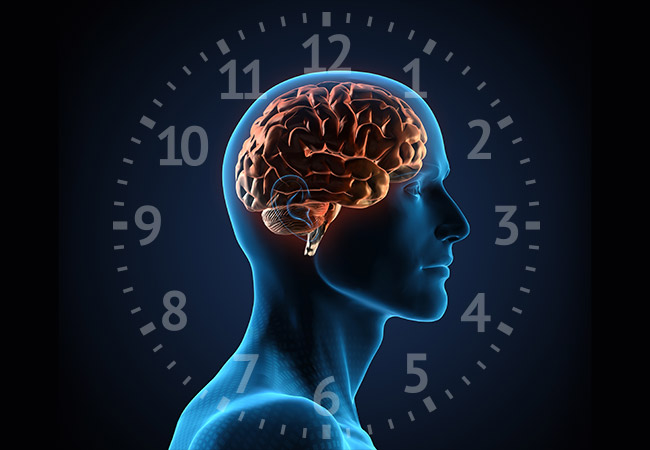If you’ve ever noticed that you tend to feel energized and drowsy around the same times every day, you have your circadian rhythm to thank.
Our blog for October has already talked about Circadian Rhythm. It is basically a 24-hour internal clock that is running in the background of your brain and cycles between sleepiness and alertness at regular intervals. It's also known as your sleep/wake cycle.
Circadian genes are very important in our body tissues. Disruption of circadian rhythms is associated with various forms of cancer in humans. There is increasing evidence that links, proper function of the clockwork, with the prevention in the development of cancer, in our body.
The master circadian clock in our body is a timekeeping system and controls multiple clocks in other peripheral tissues of the body. Many studies have shown that proper regulation of circadian clock gene is implicated in the prevention of cancer and other diseases.
 Disruption of circadian rhythms accelerates tumor progression, and potentially restoring circadian rhythms, improve the health of the body. The circadian clock runs in sync with environmental light-dark cycles and helps to adapt metabolic and behavioural patterns such as daily cycles of rest and activity.
Disruption of circadian rhythms accelerates tumor progression, and potentially restoring circadian rhythms, improve the health of the body. The circadian clock runs in sync with environmental light-dark cycles and helps to adapt metabolic and behavioural patterns such as daily cycles of rest and activity.
As far as skin cancer is concerned, the main cause is DNA damage induced by the UV rays from sunlight. A mechanism called nucleotide excision repair is able to fix some of this damage at the cellular level and prevent it from developing into cancer.
The speculation:
A research conducted by Gaddameedhi in mouse models, has found that the circadian clock regulates the repair system’s activity. In his experiment, he irradiated mice with UV rays three times a week for 25 weeks. One group was irradiated at 4 a.m., the other group at 4 p.m. The morning group was five times more likely to develop tumors than the afternoon group.
The ostensible conclusion:
The findings suggest that people may be more at risk of developing cancer if they are exposed to UV rays in the afternoon rather than morning.
His research is now extending into whether the circadian clock also determines the best times to receive chemotherapy treatments for cancer.
Your circadian rhythm works best when you have regular sleep habits, like going to bed at night and waking up in the morning around the same times from day to day (including weekends). When things get in the way, like jet lag, daylight savings time, or a compelling sporting event on TV that keeps you up into the wee hours of the morning, you can disrupt your circadian rhythm, which makes you feel out of sorts and can make it harder to pay attention.
Our blog for October has already talked about Circadian Rhythm. It is basically a 24-hour internal clock that is running in the background of your brain and cycles between sleepiness and alertness at regular intervals. It's also known as your sleep/wake cycle.
Circadian genes are very important in our body tissues. Disruption of circadian rhythms is associated with various forms of cancer in humans. There is increasing evidence that links, proper function of the clockwork, with the prevention in the development of cancer, in our body.
The master circadian clock in our body is a timekeeping system and controls multiple clocks in other peripheral tissues of the body. Many studies have shown that proper regulation of circadian clock gene is implicated in the prevention of cancer and other diseases.
As far as skin cancer is concerned, the main cause is DNA damage induced by the UV rays from sunlight. A mechanism called nucleotide excision repair is able to fix some of this damage at the cellular level and prevent it from developing into cancer.
The speculation:
A research conducted by Gaddameedhi in mouse models, has found that the circadian clock regulates the repair system’s activity. In his experiment, he irradiated mice with UV rays three times a week for 25 weeks. One group was irradiated at 4 a.m., the other group at 4 p.m. The morning group was five times more likely to develop tumors than the afternoon group.
The ostensible conclusion:
The findings suggest that people may be more at risk of developing cancer if they are exposed to UV rays in the afternoon rather than morning.
His research is now extending into whether the circadian clock also determines the best times to receive chemotherapy treatments for cancer.
Your circadian rhythm works best when you have regular sleep habits, like going to bed at night and waking up in the morning around the same times from day to day (including weekends). When things get in the way, like jet lag, daylight savings time, or a compelling sporting event on TV that keeps you up into the wee hours of the morning, you can disrupt your circadian rhythm, which makes you feel out of sorts and can make it harder to pay attention.










0 comments:
Post a Comment